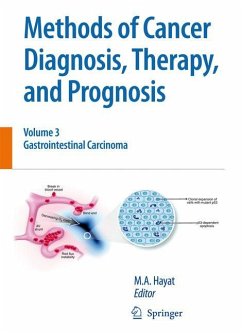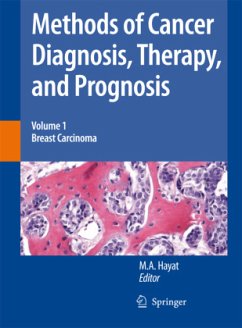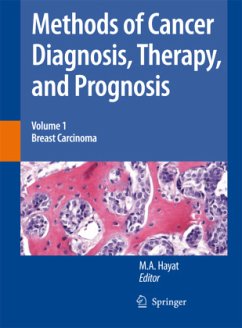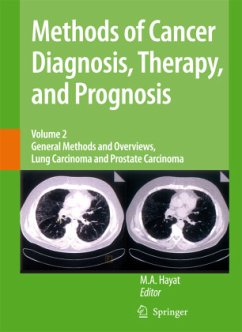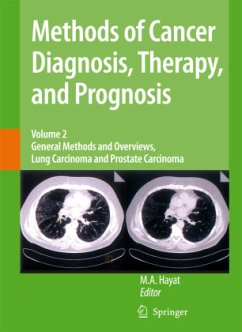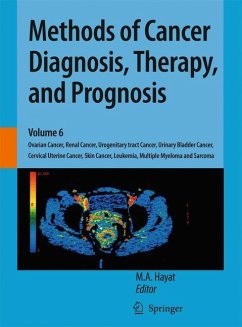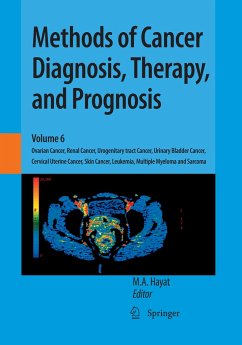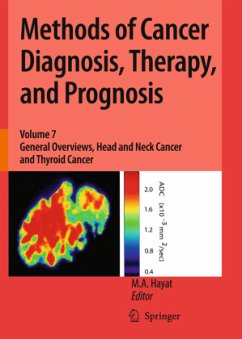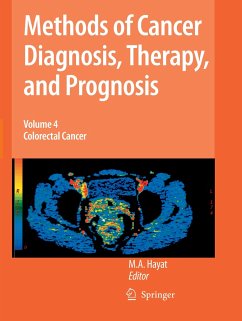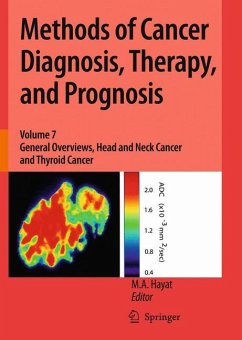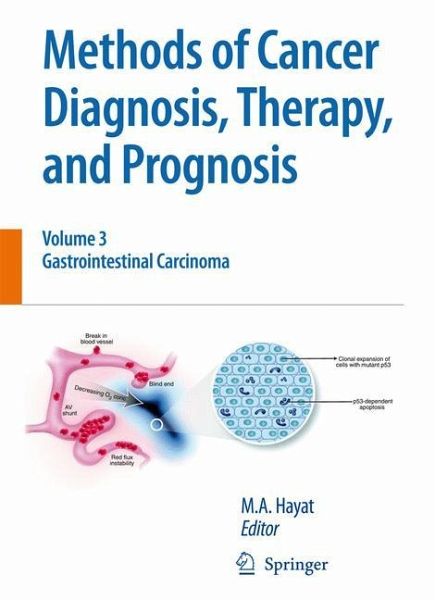
Methods of Cancer Diagnosis, Therapy and Prognosis
Gastrointestinal Cancer
Herausgegeben: Hayat, M. A.

PAYBACK Punkte
76 °P sammeln!
This third volume in the series Methods of Cancer Diagnosis, Therapy and Prognosis discusses diagnosis, therapy, and prognosis of Gastrointestinal Cancers. Both standard and emerging therapies for these cancers, written by expert oncologists/pathologists in this field, are included.
This fully illustrated volume
* Includes various aspects of esophageal cancer, gastric cancer, and pancreatic cancer
* Highlights the methodologies used for diagnosis, therapy, and prognosis of these different cancers
* Explains the molecular mechanisms underlying these cancers
* Discusses the evaluation of FDG-PET/CT fusion imaging, endoscopic ultrasound and imaging, and the role of microRNA in prognosis
* Details the classification of colon and gastric histological samples
* Highlights treatments, including radiofrequency ablation and surgical debulking, endoscopic submucosal dissection, laparoscopic gastrectomy of gastric cancer and pancreaticoduodenectomy
* Reviews use of radiotherapy and chemotherapy for pancreatic cancer patients
* Discusses a large number of imaging modalities for diagnosing these cancers and assessing the different treatments
Professor Hayat has summarized the problems associated with the complexities of research publications and has been successful in editing a must-read volume for oncologists, cancer researchers, medical teachers and students of cancer biology.
This fully illustrated volume
* Includes various aspects of esophageal cancer, gastric cancer, and pancreatic cancer
* Highlights the methodologies used for diagnosis, therapy, and prognosis of these different cancers
* Explains the molecular mechanisms underlying these cancers
* Discusses the evaluation of FDG-PET/CT fusion imaging, endoscopic ultrasound and imaging, and the role of microRNA in prognosis
* Details the classification of colon and gastric histological samples
* Highlights treatments, including radiofrequency ablation and surgical debulking, endoscopic submucosal dissection, laparoscopic gastrectomy of gastric cancer and pancreaticoduodenectomy
* Reviews use of radiotherapy and chemotherapy for pancreatic cancer patients
* Discusses a large number of imaging modalities for diagnosing these cancers and assessing the different treatments
Professor Hayat has summarized the problems associated with the complexities of research publications and has been successful in editing a must-read volume for oncologists, cancer researchers, medical teachers and students of cancer biology.
Each year, tens of millions of people are respectively. The following data indicate diagnosed worldwide with cancer, and the burden (seriousness) of gastrointestinal more than half of these patients eventu- cancer, liver cancer, and colorectal cancers ally die from this disease. The severity of globally and in the United States. (Table 1) the burden of cancer becomes really clear Surgical and molecular therapies and pr- by knowing that there were ? 10, 862, 496 nostic markers for gastrointestinal stromal new cancer cases (excluding skin cancer) tumors are discussed in this volume. Role in the world in 2002, and the number of of anticancer drugs and monoclonal an- deaths caused by this disease in the same bodies specific for these tumors are also year was ? 6,723,887 (GLOBOCAN). discussed. Imaging modality assessing the The number of deaths due to cancer in the effect of anticancer imatinib on these tumors United States was estimated to be 559, 650 is included. Diagnostic and prognostic (Am. Cancer Soc. ). Cancer is caused by markers of clinical outcomes using che- both external factors (tobacco, chemicals, therapy and hormone replacement therapy radiation, and infectious organisms) and for gastric adenocarcinoma are detailed. internal factors (inherited mutations, hor- Also, are discussed immunohistochem- mones, immune conditions, and mutations try of esophageal cancer progression, and that occur from metabolism). diagnostic and therapeutic methodologies All cancer types caused by cigarette for biliary tumors.




